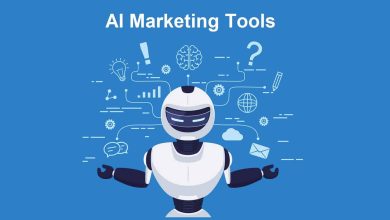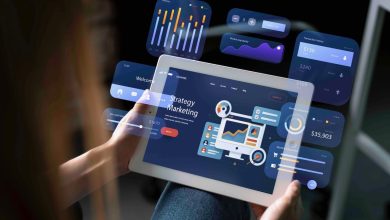
Picture this: It’s 2030, and marketing teams have transitioned from manual guesswork into hyper-personalized campaigns that anticipate consumer desires before they even materialize – thanks to advanced AI technologies. Just six years ago, businesses debated whether to adopt AI in marketing at all. Today, they wonder how they ever operated without it.
The rapid surge in AI adoption is reshaping marketing, transforming every touchpoint between brands and their audiences. With AI technologies evolving swiftly, marketers face new opportunities and challenges that will define the next era of marketing leadership.
The Surge of AI Adoption in Marketing
What’s fueling the dramatic rise of AI among marketers, particularly in the UK? Simply put, there is pressure to meet increasingly sophisticated consumer expectations, the necessity of data-driven decisions, and the competitive landscape.
Consumers today expect tailored, seamless experiences across every interaction. According to a recent McKinsey report, 71% of consumers demand personalization from brands, with 76% frustrated when they don’t receive it. Such consumer expectations drive UK marketers toward AI solutions that are capable of delivering experiences that resonate on an individual level.
At the same time, marketers face relentless pressure to justify spending and demonstrate measurable outcomes. AI’s ability to automate repetitive tasks and optimize spending is an irresistible proposition, streamlining operations while amplifying return on investment. Tools once accessible only to large enterprises have become simpler, cheaper, and increasingly user-friendly, empowering even small businesses to jump aboard the AI bandwagon.
Three Pillars: Personalization, Automation, and Predictive Analytics
Personalization:
Personalization is no longer optional – it’s foundational. AI-driven tools now analyze customer behavior, browsing history, purchases, and even sentiment in real time, dynamically tailoring everything from emails to entire websites. A customer searching online for vegan recipes sees marketing campaigns highlighting vegan products in their neighborhood grocery store, precisely matching their current lifestyle and location. AI-driven personalization creates meaningful connections, enhancing brand relevance and customer loyalty.
Automation:
Automation, the bedrock of modern marketing efficiency, has transitioned from basic scheduling into sophisticated AI-powered orchestration. Platforms now autonomously optimize digital campaigns, continuously adjusting budgets, targeting criteria, and creative elements without manual intervention. Marketers who previously spent hours managing ad campaigns now direct their attention to creative innovation and strategy development, confident that AI manages the tedious, data-intensive tasks efficiently.
Predictive Analytics:
Perhaps the most transformative is AI’s predictive capability. Predictive analytics allow marketers to anticipate consumer needs, identifying churn risks and purchasing triggers long before traditional methods. For instance, an AI-enabled CRM can predict precisely when a customer might consider switching to a competitor, proactively triggering a personalized retention campaign. This proactive approach dramatically improves customer retention rates, reduces acquisition costs, and ensures marketers stay several steps ahead of their competition.
Real-World Challenges and Solutions for AI Integration
Despite AI’s clear benefits, marketers face substantial challenges when integrating AI into workflows. Chief among these challenges is internal resistance. Teams accustomed to traditional approaches often view AI skeptically, fearing it may render their roles obsolete. To overcome this, organizations must emphasize AI’s role as an enhancer of human creativity rather than a replacement. Regular training and transparent communication build trust and understanding, empowering marketers to collaborate confidently with AI tools.
Another significant hurdle, particularly prominent in the UK, is navigating the landscape of data privacy, security, and ethical considerations mandated by regulations such as GDPR. Marketers must tread carefully, balancing hyper-personalization with privacy. Transparent disclosure of how data is used, robust anonymization procedures, and ensuring ethical AI governance are non-negotiable to ensure both compliance and consumer trust.
The perceived complexity of AI solutions further hinders adoption. While AI tools have become simpler, many marketers still fear complexity. The best approach is incremental adoption: Start small with simple tools and gradually expand as teams build confidence. Small, measurable victories pave the way for broader integration, reducing resistance and building internal momentum.
Finally, organizations must guard against AI dependency without human oversight. AI-driven insights can be misleading if taken as absolute truth without human judgment. Combining AI’s analytical power with human intuition and experience ensures the best of both worlds – data-driven decision-making with human judgment at the helm.
Bold Predictions: The AI-Powered Marketing Landscape of 2030
Looking ahead to 2030, the AI-driven marketing transformation will yield a landscape dramatically different from today’s reality. Here are several bold but realistic predictions:
- Fully Autonomous Marketing Campaigns:
By 2030, marketers will manage AI-powered platforms capable of autonomously launching and optimizing campaigns, from concept creation to execution, continually adapting based on real-time data. - Seamless Integration Across Systems:
AI marketing tools will seamlessly integrate with enterprise-wide systems, from CRM and sales pipelines to inventory management and customer service, creating a unified, real-time view of customer journeys and behaviors. - Emergence of “Marketing Engineers”:
Marketing roles will evolve dramatically, creating new positions that blend data science, engineering, and traditional marketing expertise. These “marketing engineers” will lead AI integration, build custom algorithms, and ensure ethical deployment. - Ethical and Regulatory Maturity:
With AI embedded deeply into marketing operations, comprehensive regulatory frameworks will emerge. Marketers will adhere to established global AI ethics standards, preventing the misuse of data and ensuring fair and unbiased customer experiences. - Real-time Adaptive Brand Experiences:
Brands will offer fluid, dynamic experiences that adapt in real-time to changing customer contexts, moods, and preferences. Physical and digital worlds will converge as AI seamlessly personalizes every consumer interaction, profoundly reshaping brand loyalty.
Conclusion
Integrating AI into marketing is no longer an aspirational future state; it is a business imperative. Personalization, automation, and AI-powered predictive analytics are fundamentally transforming how marketers engage, attract, and retain customers. Yet, success hinges on thoughtful integration, combining AI’s analytical precision with human intuition, ethical responsibility, and creative innovation.
The AI marketing revolution promises unparalleled opportunities for brands that strategically embrace it. By 2030, marketers who successfully integrate AI will do more than simply keep pace—they will fundamentally redefine the rules of engagement, transforming consumers into lifelong brand advocates.
Rather than simply anticipating the future of marketing, those harnessing AI today are actively inventing it.





